Author: Sophia Thomas
How to Innovate FinTech in Canada
This is an excerpt from Canada 2020’s upcoming report ‘Being Innovative: Canada’s Next Big Challenge.’ The report will be released in early November, 2016.

By Mike Moffatt
Assistant Professor, Western University
Financial Technology (known as fintech) investments are growing rapidly in Canada, with OMERS Ventures reporting that 100 fintech start-ups in Canada have collectively raised more than $1 billion in funding since 2010.
As part of our research for the Canada 2020 innovation project, we held a roundtable discussion in Toronto with representatives from big banks, non-governmental organizations, fintech startups, venture capital companies and government.
We wanted to talk about how Canada can be more innovative in a sector which is so important to our country’s economy. Here’s some of what we heard:
Market structure and incentives:
When asked, “What is the biggest barrier to innovation in Canada’s financial sector?” a common answer was the structure of the industry and the incentives that it creates. Canada’s financial sector is dominated by six big banks. Due to the oligopolistic nature of the industry (caused, in part, by high barriers to entry), Canada’s Big Six are more profitable than similarly sized banks in other countries. Combined, Canada’s six largest banks earned $35 billion in profit last year.
In the view of some start-ups, this creates an incentive for the banks to fight disruptive innovations, as those disruptions put oligopolistic profits at risk. However, the counter-argument was given that the banks recognize that these innovations are inevitable, so the banks have an incentive to be active participants, rather than facing challenges from outside, such as from global players like Google and Apple.
Stability versus innovation:
Innovation is a tricky concept in the financial services industry since innovations are seen as playing a role in the Financial Crisis. The roundtable unanimously recognized that regulators have an important role in protecting consumers as well as in protecting the integrity of the financial system from systemic risks. It was recognized that regulators have the near-impossible task of finding a way to protect the system while not stifling useful innovations and keeping abreast of rapidly changing technologies.
A concern was raised that regulators are judged solely on their ability to prevent “bad things from happening,” which comes at a cost of innovation. One participant gave an analogy of judging road-safety regulatory bodies solely on the number of crashes, saying their response would be to “[make] all roads five miles per hour.” A suggestion was made that financial industry regulators be given a dual mandate of consumer protection and innovation development.
Cultural barriers to innovation:
A concern was raised that Canadian investors and managers may be too risk averse to be full participants in a highly innovative industry. As one participant put it, “[In Canadian MBA programs] there’s not a lot on how to take risk … . In [New York], the mentality of grads out of the U.S. is to take risks. There’s an acceptance that if you do that and fail that’s OK. In Canada, there’s stigma around failure.” A suggestion was made that foreign investors from countries with higher appetites for risk, such as China, may be able to fill some of the financial (but not necessarily managerial) gaps.
Immigration issues:
If there are talent (or cultural) gaps in the system, immigration might offer an answer. However, one roundtable participant noted that it takes so long to bring executive-level talent into Canada under the Temporary Foreign Worker Program that a candidate will have typically moved on to other opportunities by the time their application is approved.
Access-to-capital gaps:
Members of the roundtable stressed the importance of looking at the entire life-cycle of a fintech company when discussing possible gaps in access to capital. The consensus was that seed funding for good ideas was available through angel investors and family members; as one participant put it, “There’s no shortage of people willing to write $50,000 cheques.” The bigger challenge appears to be finding enough money to reach scale, with our fintech roundtable reporting that it is more difficult to find second-round funding than it is first. Canadian venture capitalists were seen as requiring higher rates of return or lower risk than their U.S. and Chinese counterparts, and there was a perceived talent gap between the quality of Canadian and American venture capitalists. Fintech companies partnering with banks was seen as an option, though there were concerns that accessing capital this way would come with too many restrictions.
Collaboration:
Members of our roundtable saw increased collaboration as a way to increase innovation in the sector. One participant felt that there were tighter ties between the investment and fintech start-up communities in the United States, which allowed for information sharing and the building of trust and stated, “Interaction, sharing ideas among startups, isn’t something you get a sense of in Canada. We need a safe spot for founder-to-founder, investor-to-investor interactions.”

Final thoughts:
Overall, the roundtable saw fantastic innovation potential in Toronto’s financial services industry thanks to banks that compete on the international stage and a critical mass of skilled graduates between Waterloo and Toronto. Increased innovation would benefit consumers, by giving them additional choices, more convenience, greater access to capital and lower costs when choosing financial products. A failure to innovate would see the profitable parts of the industry swallowed up by large U.S. players, with Canadian banks largely becoming commodity producers.
Mike Moffatt is an Assistant Professor at Western University’s Ivey School of Business.
This is an excerpt from Canada 2020’s upcoming report ‘Being Innovative: Canada’s Next Big Challenge.’ The report will be released in early November, 2016.
Advisory: Canada and Mexico Environment Ministers to talk climate collaboration at Canada 2020 ahead of NALS
June 28, 2016 (OTTAWA) – Canada 2020 is pleased to announce that it will be hosting a conversation between Canada and Mexico’s top environment and climate change officials tomorrow in Ottawa.
The Honourable Catherine McKenna, Canada’s Minister of Environment and Climate Change, and Rafael Pacchiano-Alamán, Mexico’s Secretary of Environment and Natural Resources will talk climate collaboration and the Canada-Mexico relationship.
Details of the event are below:
-
Date: TODAY, Tuesday, June 28, 2016
-
Time: 12:30 – 2:00 PM (speeches and Q / A beginning at 1:10 PM ET)
-
Location: Chateau Laurier (Drawing Room)
-
Participants: Hon. Catherine McKenna and Secretary Rafael Pacchiano-Alamán
Media are invited to attend, and risers and feedboxes will be provided. Canada 2020 will also be livestreaming the talk on Canada2020.ca and our YouTube channel.
Proposals for a North American Climate Strategy

Canada 2020 has partnered with leading U.S., Canadian and Mexican think-tanks ahead of the North American Leaders’ Summit to draft a new report calling for greater collaboration on climate change.
In December 2015, more than 190 nations adopted the Paris Agreement, a legally binding pact that aims to limit greenhouse gas pollution and build global resilience to the effects of climate change. The agreement required years of negotiation and tremendous political will, but world leaders now face an even greater task: implementation. In order to fulfill the agreement’s vision of net-zero greenhouse gas emissions, countries will need to meet their national climate goals, strengthen those goals over time, and spur progress globally through international forums. In all of these efforts, countries can be more effective acting as allies rather than alone.
For the first time in recent memory, the national governments of the United States, Mexico, and Canada are politically aligned on climate change. The three countries should take this opportunity to explore and launch coordinated climate initiatives that could propel the shift to clean energy across the continent and—through international leadership—accelerate the reduction of greenhouse gas pollution globally.
Recognizing the strong role that an allied North America could play in the movement to address climate change, a coalition of think tanks in the United States, Mexico, and Canada—including the Center for American Progress, the Centro de Investigación y Docencia Económicas, the Centro Mexicano de Derecho Ambiental, the Pembina Institute, the World Resources Institute, and Canada 2020—has identified a set of trilateral initiatives that could be both effective and within the power of the three governments to undertake.
On June 29, 2016, President Barack Obama, President Enrique Peña Nieto, and Prime Minister Justin Trudeau convene for the North American Leaders’ Summit in Ottawa, Ontario. This summit provides a near-term opportunity for the three leaders to explore options for trilateral cooperation—such as the initiatives detailed in this report—and to articulate a coordinated North American climate plan.
Q&A: Canada 2020’s Founders, 10 Years Later
Q&A: Canada 2020’s Founders, 10 Years Later
In June 2006, more than 200 people gathered at Mont Tremblant to discuss a vision for a more progressive Canada.
It was the first ever meeting of what would become Canada 2020, a new upstart think-tank for Canada’s progressive community.
10 years later and Canada 2020 has grown into one of Canada’s leading think-tanks, publishing books, reports, and convening over 150 events, with hundreds of speakers on stage in front of thousands of engaged Canadians.
To mark the occasion, we asked co-founders Tim Barber, Susan Smith, and Tom Pitfield to reflect on the past decade — the successes, the challenges — and give us some insight into what’s on the horizon.
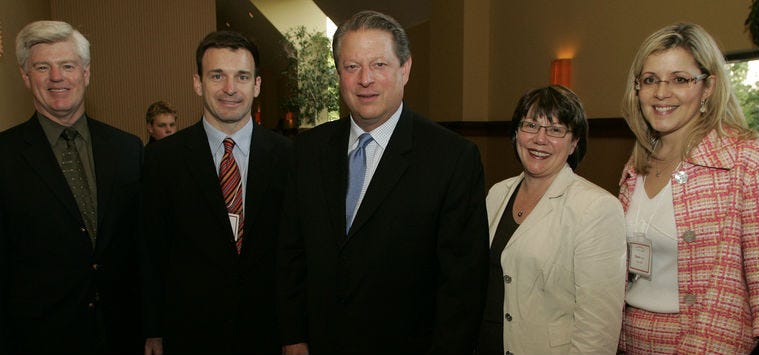
What was your vision for Canada 2020 when you organized that first meeting at Mont Tremblant in 2006?
Tim: We wanted to launch a new think tank in a country where there was a lack of progressive infrastructure. In general, Canada had a real lack of think tanks and what we hoped was that the Tremblant meeting would give us a lift as we started this new project called Canada 2020.
Susan: Our goal was to create an independent forum for progressive policy discussions that focus on the kind of Canada we wanted in 2020. Our thought was that some of the important and “pointy” policy discussions that needed to be had, couldn’t be had within the bureaucracy or the umbrella of a political party. We also wanted to convene people, bring together like-minded, progressive folks and launch a conversation. The exciting thing is, 10 years later, the audience has grown and the conversation continues. We also always reserve the right to “bring in speakers or topics because they were cool” — and our audiences enjoy that too.
Tom: We wanted to create an environment and have informed discussions we just weren’t having in government. We were disillusioned by the kinds of policy discussions we were having. They were safe, they were driven by polls and political aspirations, and they weren’t really honest conversations about what mattered to Canadians and how to improve Canada. We thought the only way we could have those dialogues was to take them outside of government and to have those debates publicly with those people who had the courage to rock the boat.
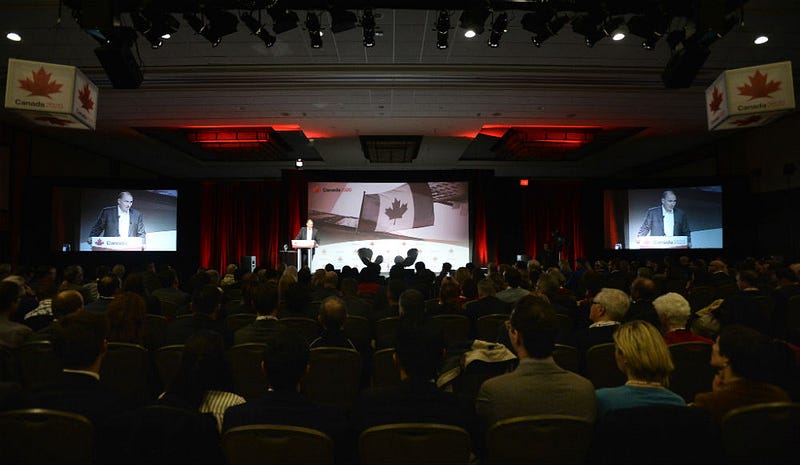
Looking back at the last 10 years of Canada 2020, what are you most proud of?
Tim: I’m most proud of the quality of the international speakers and the international perspectives we brought to Ottawa through our events, our research and our writing. The overall quality of the programming we have put together over the last decade has been amazing. I’m very proud of the people we’ve brought into Ottawa, into Canada — and it wouldn’t have happened without Canada 2020. As a Canadian, I get bashful when people tell me how amazing these events by Canada 2020 are, but it’s true.
Susan: Surviving! I’m proud of how we’ve become a trusted forum and we’ve created a conversation space through our free public events for interesting and dynamic policy discussion. We have gone from having to tell everyone who Canada 2020 is, to having people say — “Yes! I’ve been to this event or that event.” When people come to Ottawa, they are often told that they should tap into what we are doing. I am also proud that we have been ahead of the conversation on topics like greening the oilsands, income inequality and infrastructure investment, with policy papers and events before they are mainstream topics.
Tom: I think that we’re still here. There are a lot of organizations that have tried to do what we do and with so many competing philosophies, principles or priorities, it’s hard to keep so many people interested in a process. I think it’s a credit to us to be able to unify so many people of disparate groups, whether you’re on the left or the right of the spectrum — or the centre of the spectrum — and I think we’ve worked very hard to be respected for our work and our convening capacity.
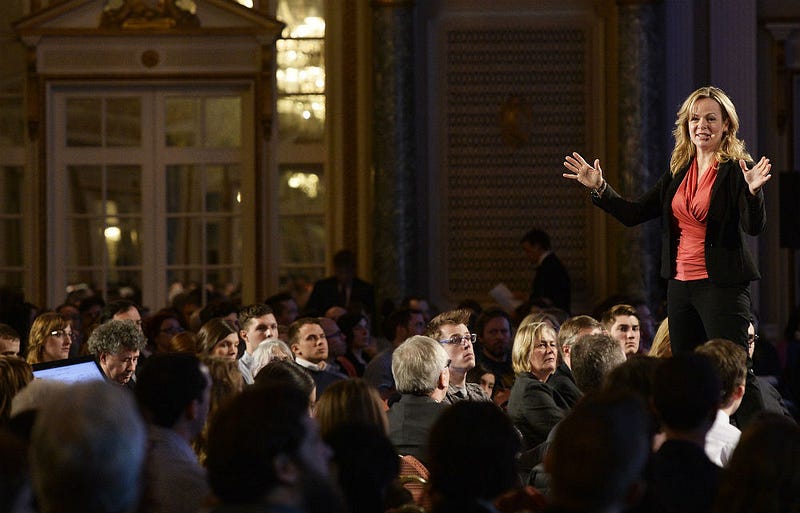
What has surprised you the most during the past decade of Canada 2020?
Tim: It’s not so much surprise, but that the past decade has validated our perspective. When you look at our followers and people that we get to our events, it’s proof there is a real appetite for what we do — and that’s wonderful. The thing I love that we’ve done more than anything is that we’ve created a large progressive community by bringing people together. That’s a wonderful achievement.
Susan: The age range and depth of interest in having robust policy conversations has surprised me. Our audience is so diverse: it’s filled with university students, senior government officials, and ordinary folks who care about the future of Canada. We have had guest speaker after guest speaker comment on the audience size and depth of our packed rooms and offer to come back. The evolution of sponsor support for the organization — it was harder than we anticipated at the beginning, but organizations now see the tremendous value in what we do.
Tom: That we’re still here. (laughs) No, really I think that what surprises me the most is the calibre of people we’ve been able to get to our events. Some of these are people I would never have met any other way. They’re not the kind of people I could just pick up the phone and call, yet a lot of these people reach out to us and ask to get involved. For me, it identifies that we weren’t alone 10 years ago when we were craving honest and meaningful public discourse. The fact is, I think progressive leaders and thinkers have been having trouble finding places to have meaningful discussions. It pleases me that they want to be a part of what 2020 is doing, and that they see 2020 as an important place to discuss things that are important to them.
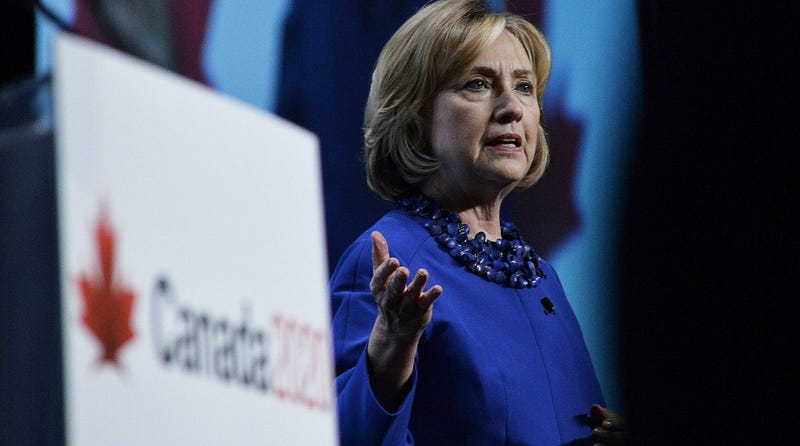
Of the hundreds of speakers on the Canada 2020 stage, who do you think had the greatest impact?
Tim: There are so many, and so many different ones. In general, because we’re small and nimble and we can turn on a dime, there have been many that we’ve held that coincide with the debate of the day. I think there are so many that I could think of where it has given me another data point or another perspective to think differently about issue. Mark Carney is always great, Larry Summers was insightful, Melody Barnes formerly of the White House came and talked about childhood obesity and Lorraine Mitchelmore spoke on carbon pricing that was important.
Susan: It’s hard to pick one. Al Gore at our launch conference had the room and all of Canada buzzing. Larry Summers’ first visit to a public stage in Ottawa was at Canada 2020, days after the 2012 election. He has now provided advice to the Liberal platform and the Trudeau government. Hillary Clinton was a highlight and was a marquee event, as was CNN’s Fareed Zakaria. Justin Trudeau has been on the Canada 2020 stage a number of times, he was at our first conference in 2006. Trudeau has spoken on a number of topics, from foreign policy to Canada-U.S. relations. National Chief Perry Bellegarde also had an important impact on our audiences.
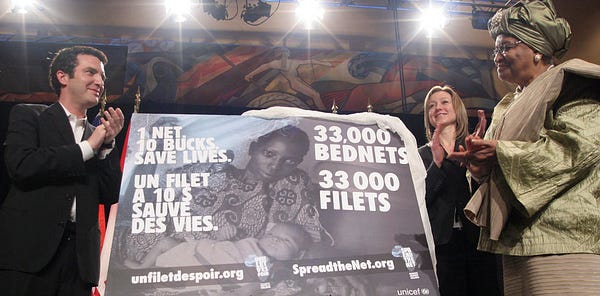
Tom: I don’t have a favourite. There are too many substantial conversations to pick one as a favourite. But in terms of impact, and as an example of the way these dialogues have affected people, this is one of my favourite stories: At our 2007 conversation, a conversation ensued between former MP Belinda Stronach and Jeffrey Sachs and comedian Rick Mercer. Shortly after Jeffrey described the degree to which an investment in a single bed net would substantially reduce the cases of malaria and improve the quality of life of people living in sub-Saharan Africa, the three of them created an organization ‘Spread the Net.’ Within months, that actually raised hundreds of thousands of dollars to ship bed nets out. I like to think that that’s one of the stories we knew about, but that every time we convene a meeting with hundreds of people, and those people have conversations afterwards and feel inspired by what they’ve just heard, I like to think that there are more little ‘bed net projects’ that are blossoming out of it, and feel as though we’ve made an impact.
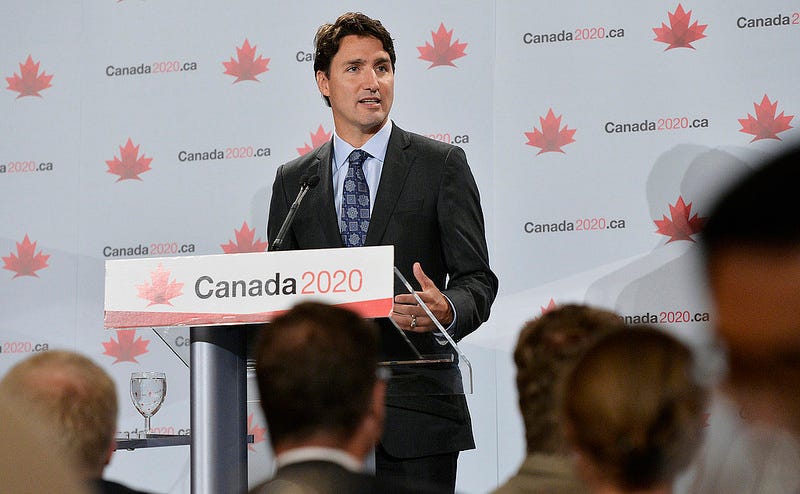
What’s your goal for the next 10 years of Canada 2020?
Tim: To keep doing more of what we’ve done — great events, more original research, scale up in terms of staff and create a permanent home of our own — a progressive “hub.” An office space with dedicated meeting facilities in the parliamentary precinct — that is the next big thing for Canada 2020.
Susan: I’d like Canada 2020 to continue influencing the progressive policy agenda for Canada. I’d like to establish a long-term donor funding base that enables us to tackle more research. I’d like to cement our role as the go-to organization for speakers when it comes to public policy, to create a physical space in Ottawa that hosts our conversations and events.
Tom: I have two goals. One is I’d like to do better at consolidating the original thinking that is coming out of what we do and expanding that thinking around original research projects. When you think of the dialogues we’re hosting, and the way we are testing ideas with Canadians, then the next phase is to take the themes and ideas that are the most popular and evolve them into projects. Secondly, once you have a position on the meaningful project is to try and find more effective, modern and digital methods of reaching the public and making them aware of the importance or value of supporting those types of initiatives.
Canada 2020 at 10: Full Event Calendar for 2016
This June, Canada 2020 officially turns 10.
To be specific, June 14th marks 10 years since our inaugural conference in Mt. Tremblant where Canada 2020 was founded.
Since that time, Canada 2020 has grown and evolved into Canada’s leading, independent, progressive think-tank. We have hosted over 150 events, written 3 books, hosted world leaders on our stage, published influential policy briefs, and engaged thousands of Canadians in conversations about Canada’s future.
To celebrate a decade of impact, we’ve put together an exciting calendar of events and special projects. Here’s some dates you should add to your calendar (and stay tuned for a few more surprises):
June 6: Global Energy Outlook 2016
Kicking off our 10 year celebrations is Canada 2020’s Global Energy Outlook for 2016.
A now annual event, Canada 2020’s Energy Outlook is a chance for us to take stock of the global energy market and Canada’s place within it. This year, Daniel Yergin – one of the most respected voices on energy in the world – will return to our stage to forecast what’s in store for the global energy market as it continues to deal with massive fluctuations and a renewed focused on clean energy.
We are also excited to announce that at the event, Daniel Yergin will sit down with the Honourable Jim Carr, Minister of Natural Resources.
This event is sold-out! You can watch it online at Canada2020.ca
June 14: Canada’s Next Big Challenge – Being Innovative
One of our most-talked about events from our 10 year history is 5 Big Ideas for Canada, a public event that saw five Canadians take our stage a pitch a bold, provocative idea for Canada’s future.
We heard from Col. Chris Hadfield, author Tom Rand, urban innovator Jennifer Keesmaat and more. It was fun, interactive, and absolutely packed full of new ideas for Canada.
That’s why we’re happy to announce that on June 14, we’ll be hosting a follow-up – this time focused entirely on innovation.
5 Innovative Ideas for Canada will ask five more impressive individuals to take our stage and pitch a bold idea that would help Canada become more innovative, more entrepreneurial and more keen to take big risks.
This event is SOLD OUT. You can watch it online at Canada20202.ca
June 15: The Canada 2020 Innovation Report – Launch Summit
Canada 2020 is pleased to announce that we are taking on a major project for 2016 focused entirely on Canada’s innovation challenge.
The Canada 2020 Innovation Report will be a significant contribution to public policy and public life in Canada, and will be the result of months of work from Canada 2020’s assembled working group of experts, advisors, and entrepreneurs who have studied Canada’s innovation problem over the past 30 years.
This multi-part project begins June 15th with a kick-off summit in Ottawa. We are bringing together political, business and thought leaders for a full-day conference focused on ensuring our working group is asking the right questions about the innovation problems across Canadian sectors like finance, health, IT, energy and more.
The entire Canada 2020 Innovation Report process will be documented online and feature opportunities for public consultation as we embark on a fact-finding mission across Canada, the U.S. and abroad to answer the central question: how can Canada be a more innovative country?
Summer 2016: The Canada 2020 Innovation Report – Summer Series
As part of the Canada 2020 Innovation Report, we will be hosting a series of roundtables, delegation visits and more over the Summer. If you are interested in engaging in this process, let us know at [email protected].
September 14 – 15: Global Progress 2016
Canada 2020 is a member of Global Progress, an international network of progressive think tanks and research initiatives. In March, Canada 2020 and Global Progress partnered to host Prime Minister Justin Trudeau during his State Visit in Washington.
This fall, Canada 2020 has been selected to host Global Progress 2016, the annual gathering of progressive political, business, NGO and thought leaders from across the world.
Held on the eve of the UN General Assembly and the Clinton Global Initiative, Global Progress is a chance for world leaders and other special guests and conference goers to meet and discuss the challenges and opportunities facing the global progressive community.
More details to come.
November 3 – 4: 3rd Annual Canada 2020 Conference
Canada 2020’s annual conference will be hosted November 3rd and 4th in Ottawa, and feature the same world-class speakers, discussion and debate about Canadian public policy. This year will also feature the presentation of the findings and recommendations from the Canada 2020 Innovation Report.
Registration will open in September 2016. If you haven’t been to Canada 2020’s last two conferences in 2014 and 2015, you’re missing out.
November 3: Canada 2020’s 10th Anniversary Gala
To close out our 10th Anniversary Year, Canada 2020 will cap celebrations off with a large fundraising Gala in Ottawa. Hosted on the first evening of the 3rd Annual Canada 2020 Conference, we have something special planned for guests. Details to come in September.
Alex Paterson is Canada 2020’s Director of Communications & Operations. You can reach him at [email protected]
Chile, Canada and the New Global Scenario
The following is an excerpt of a speech given by Chilean Foreign Minister Heraldo Muñoz, at a recent Canada 2020 event in Ottawa. Read the full text of the speech here, on Medium.
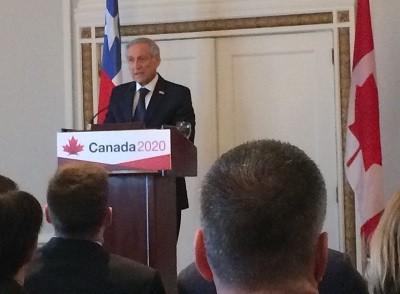
“The challenge for foreign policymakers is how to skillfully combine principles and national interests in the best way possible for addressing the complex challenges of this turbulent world.
How should we deal with today´s economic, social and cultural global challenges so different from those of past decades, when no one had a PC or even dreamed of an iPad, but when the Soviet Union still existed?
- First, we have to deepen our openness to the world and add value to our exports.
- Second, we must contribute to global governance, particularly in the most sensitive issues for Chile.
- And third, continue to prioritize Latin America and the Caribbean, promoting convergence in diversity; in other words, a pragmatic regionalism.
The ability to innovate and to create added value is fundamental for national economic growth.
For Chile, the transition from an economic model based on the production and export of natural resources to one based on creativity and innovation is a must. Of course, we can also innovate by adding value to our natural resources.
Chile is an open economy with a wide network of trade agreements: 25 free trade agreements (FTAs) with 64 countries, accounting for 94% of Chile’s exports. Our main challenge is to add value to our products as well as integrate ourselves to global and regional value chains.
We are negotiating new free trade agreements with Indonesia, for example, while pursuing talks with the Philippines and continue working on the updating of our agreements, including the Canada-Chile FTA, in order to increase cooperation in key areas, such as innovation, science and technology, and education.
The FTA Chile-Canada has proven to be a great success. Since its entry into force, bilateral trade has grown at annual average of 7%. Canada is one of the top ten trade partners of Chile, reaching in 2015 almost US$ 2 billion. In the last two years, our bilateral Agreement was modernized, incorporating chapters on Sanitary and Phytosanitary Measures and Technical Barriers to Trade, as well as several improvements to the Rules of Origin and to the Government Procurement chapters. We expect that the Canadian authorities will complete their domestic procedures soon, bringing these modifications into force.
Let me add that Chile is Canada’s third largest investment destination in Latin America and the 8th worldwide; actually, Canada is Chile’s main investor in mining.
China has become the main trading partner for Chile and other Latin American countries. We are advancing in the implementation of the Plan of Action signed during the bilateral visit of Prime Minister Li Keqiang last year. Moreover, we are negotiating with China an update of our bilateral trade agreement.
Another important step is the Trans-Pacific Partnership Agreement (TPP), which brings together 12 countries on the Pacific Rim, accounting for 485 million people and close to one third of world trade, including Chile and Canada. This agreement sets and raises the global standard in the trade of goods, services, and investment, as well as other trade disciplines…”
Read the full text of Chilean Foreign Minister Heraldo Muñoz’s speech here, on Medium.
